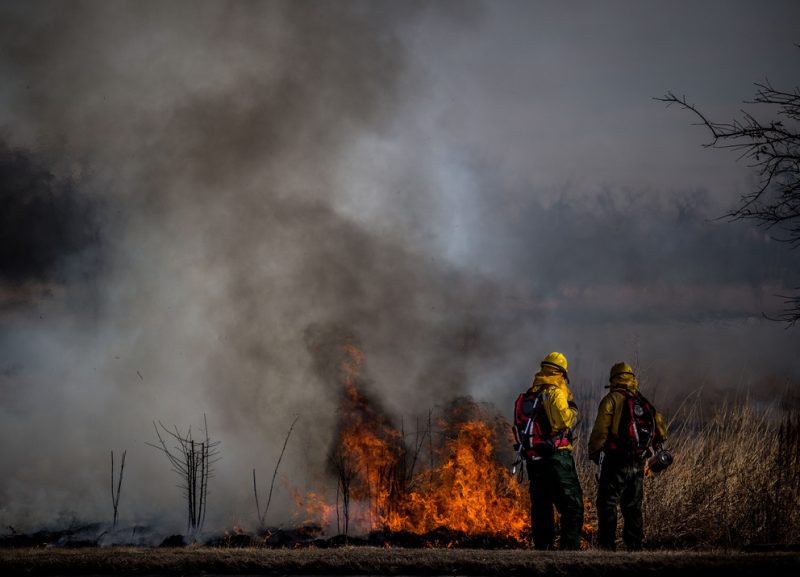Management tool promotes desired trees, controls invasive plants, helps wildlife, suppresses ticks
UNIVERSITY PARK, Pa. — Pennsylvania state agencies that manage public forest lands increasingly have employed prescribed fire as a management tool, but significant challenges exist for private landowners to do the same.
Now, Penn State Extension is launching a program to help them use prescribed fire, too.
Using low-intensity fire to help manage forests offers many benefits, according to Jesse Kreye, assistant professor of fire and natural resources management in Penn State’s College of Agricultural Sciences.
Among those benefits are promoting desired tree species such as oak, spurring new growth that provides food and cover for wildlife, controlling invasive plants and suppressing ticks, which often carry pathogens such as the one that causes Lyme disease.
“In a number of states, such as Florida, hundreds of thousands of acres are burned in a controlled way each year to manage private forest land,” said Kreye, who is spearheading creation of the new extension initiative. “We believe that forest landowners in Pennsylvania could have that option.”
Fire was used historically in Pennsylvania, Kreye pointed out, and the state’s forests have changed a lot over the last century because of a lack of fire.
Because there was considerable interest in bringing fire back to help restore the landscape, the General Assembly in 2009 passed legislation called the Prescribed Burning Act.
The law changed liability statutes and essentially gave land managers in the state who observe a suite of specified precautions the ability to use prescribed fire as a forest-management tool.
“But even though agencies such as the Pennsylvania Department of Conservation and Natural Resources and the Game Commission have been burning on their properties over the last 10 years, private landowners have largely been unable to use the tool,” Kreye said.
“And there are still a lot of people in Pennsylvania who aren’t aware of why they should be using controlled fire and what benefits it provides.”
Initially, the extension program will focus on public education. Kreye is developing publications, to be offered both online and in print, that will explain the benefits of using prescribed fire and precautions that must be followed in Pennsylvania.
He also is planning prescribed fire education videos for private landowners.
While some aspects of the Fire and Natural Resource Management program have yet to be finalized, Kreye sees Penn State Extension’s role as organizational, such as working with the Pennsylvania Prescribed Burn Council to help private landowners form burn associations common in other states, offering training to those groups and helping them make arrangements with certified burn bosses required by state law to conduct controlled burns.
Another important role of the program would be to provide training to increase the number of certified burn bosses. In addition, training will be needed on how to write prescribed burn plans and actually conduct a burn, monitor weather and so forth.
“Extension might organize landowners to work together with a burn boss to conduct a prescribed fire on several properties that would be too small to feasibly be burned alone,” he said.
Kreye’s research, which he has conducted for about a decade in Florida and California, is aimed at quantifying how fire benefits forest landscapes.
He believes the upside in Pennsylvania is huge, for both public and private landowners.
“Controlled fire offers the opportunity to restore important ecosystems here such as the oak forest, and the need to reduce tick populations is compelling,” he said.
“Pennsylvania has the worst tick and Lyme disease problem in the country — and burning can reduce that. Prescribed fire also may prove to be an important tool in the fight against invasive plants.”
Chris Houser, Penn State Extension assistant director for natural resources programs, noted that it will take some time for the new prescribed fire program to gain traction, but that extension is committed to helping forest landowners.
“Our hope is that we can help increase the capacity of people trained to conduct prescribed fire on private lands in Pennsylvania,” he said. “Right now, it is extremely difficult for private landowners to use fire on their own properties.”
For more information, contact Kreye at 814-863-2509 or juk1097@psu.edu.
